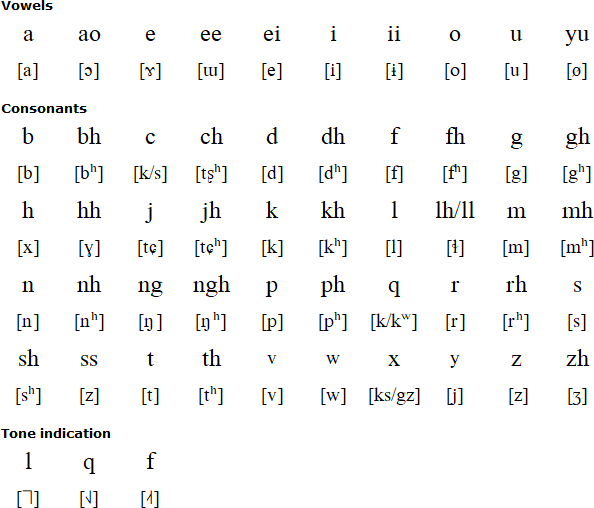Hani is a member of the Lolish branch of the Lolo-Burmese language family. It is spoken in Yunnan province in southern China, in Lai Châu and Lào Cai provinces in northwestern Vietnam, and in Phongsaly Province in Laos. In 2007 there were about 760,000 speakers of Hani.
According to oral tradition, Hani used to written with its own script, however this was lost when the Hani people moved from Sichuan in China. A way of writing Hani with the Latin alphabet based on the dialect of Luchun County was created by the Chinese government in the 1950s. Hani has also been written with scripts based on Thai and Chinese.
Hani is used in schools, literature and the media, and about 40,000 Hani speakers are literate in their language. Others use Chinese.

When a syllable does not end in l, q or f, it has a mid-level tone [˧˧].
Download an alphabet chart for Hani (Excel)
Aqsol liq yoqdeivq yoqpyuq bo, meeqyaovq ssolnei colpyuq qiq kov dei. Davqtavcolssaq neenyuq bel neema meeq ya siq, laongaoq meilnaol nadul meil e gaq ssol hhyul hha bavqduv nia.
All human beings are born free and equal in dignity and rights. They
are endowed with reason and conscience and should act towards one another
in a spirit of brotherhood.
(Article 1 of the Universal Declaration of Human Rights)
Information about Hani | Numbers
Information about Hani
https://en.wikipedia.org/wiki/Hani_language
https://www.ethnologue.com/18/language/hni/
http://factsanddetails.com/china/cat5/sub31/entry-4393.html
http://www.shinyfiction.com/cherryh-fan/chanur/hani/hani-phonetics.html
Achang, Akha, Bisu, Burmese/Myanmar, Hani, Lahu, Lashi, Lipo, Lisu, Lolopo, Marma, Nisu, Nusu, Nuosu, Sani, Zaiwa
Languages written with the Latin alphabet
Page last modified: 13.03.25
[top]
You can support this site by Buying Me A Coffee, and if you like what you see on this page, you can use the buttons below to share it with people you know.

If you like this site and find it useful, you can support it by making a donation via PayPal or Patreon, or by contributing in other ways. Omniglot is how I make my living.
Note: all links on this site to Amazon.com, Amazon.co.uk
and Amazon.fr
are affiliate links. This means I earn a commission if you click on any of them and buy something. So by clicking on these links you can help to support this site.
[top]